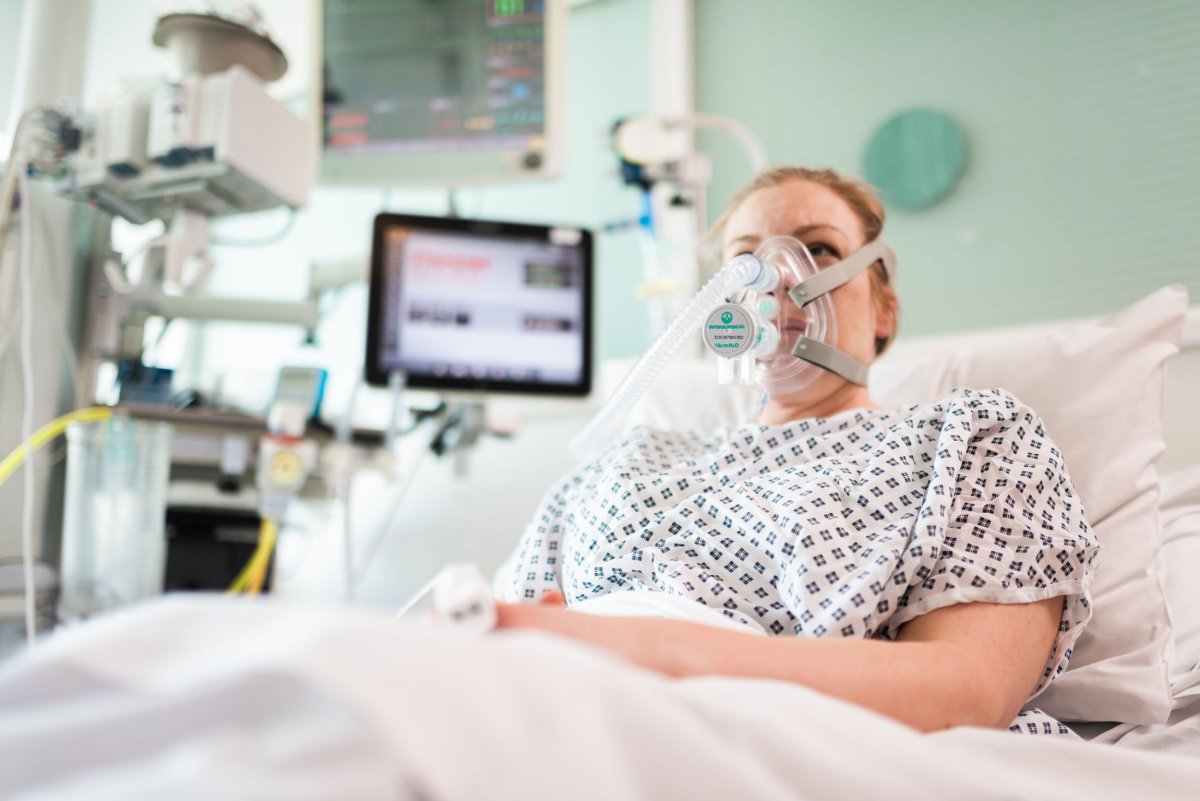The U.K's National Health Service (NHS) has approved the use of a new breathing aid adapted in under a week by university engineers working alongside experts from Formula One.
The machine, known as Continuous Positive Airway Pressure (CPAP), is intended to help keep patients with severe cases of COVID-19 out of intensive care. The device has already been used in hospitals in Italy and China, providing non-invasive aid if a person is having difficult taking in air naturally.
COVID-19, an infectious respiratory disease caused by a novel coronavirus, has spread to more than 720,000 people and caused more than 34,000 deaths globally.
The project is a collaboration between engineers at University College London, University College Hospital and Mercedes-AMG High Performance Powertrains (Mercedes-AMG HPP).
CPAP machines work by pushing oxygen into a person's mouth and nose while keeping the airways open, steadily increasing the amount of oxygen entering the lungs.
For comparison, ventilators can be more invasive—delivering breaths directly into the lungs but needing a patient to be sedated and have a medical tube placed into their windpipe.
The joint teams worked at pace, reverse engineering a device that can be made rapidly in the thousands. Starting March 18, the aid was made in fewer than 100 hours from the initial meeting to production of the first device, the teams said today ahead of a trial period beginning.
"These devices will help to save lives by ensuring that ventilators, a limited resource, are used only for the most severely ill," said UCLH critical care consultant Professor Mervyn Singer.
"While they will be tested at UCLH first, we hope they will make a real difference to hospitals across the U.K. by reducing demand on intensive care staff and beds, as well as helping patients recover without the need for more invasive ventilation," Singer added.

The university researchers said reports from Italy indicate that around 50 percent of COVID-19 patients given CPAP have not needed invasive ventilators, which are in short supply globally.
Professor Tim Baker, of UCL Mechanical Engineering, said: "Given the urgent need, we are thankful that we were able to reduce a process that could take years down to a matter of days.
"From being given the brief, we worked all hours of the day, disassembling and analysing an off-patent device. Using computer simulations, we improved the device further to create a state-of-the-art version suited to mass production," Baker continued.
A total of 100 devices are scheduled to be delivered to UCLH for clinical trials, with further roll-out to hospitals around the U.K. ahead of the predicted surge in COVID-19 admissions.
The BBC reported up to 1,000 of the machines can be made per day if the trials are a success. A company called Oxford Optronix is set to manufacture oxygen monitors for the devices.
The Formula One division is working under the codename "Project Pitlane," relying on resources of the industry to produce medical equipment following an appeal by the British government.
"The Formula One community has [now come] together in the 'Project Pitlane' collective to support the national need at this time across a number of different projects," said Andy Cowell, managing director of Mercedes-AMG High Performance Powertrains. "We have... put our resources at the service of [the] project to the highest standards and in the fastest possible time frame."
World Health Organization advice for avoiding spread of coronavirus disease (COVID-19)
Hygiene advice
- Clean hands frequently with soap and water, or alcohol-based hand rub.
- Wash hands after coughing or sneezing; when caring for the sick; before, during and after food preparation; before eating; after using the toilet; when hands are visibly dirty; and after handling animals or waste.
- Maintain at least 1 meter (3 feet) distance from anyone who is coughing or sneezing.
- Avoid touching your hands, nose and mouth. Do not spit in public.
- Cover your mouth and nose with a tissue or bent elbow when coughing or sneezing. Discard the tissue immediately and clean your hands.
Medical advice
- Avoid close contact with others if you have any symptoms.
- Stay at home if you feel unwell, even with mild symptoms such as headache and runny nose, to avoid potential spread of the disease to medical facilities and other people.
- If you develop serious symptoms (fever, cough, difficulty breathing) seek medical care early and contact local health authorities in advance.
- Note any recent contact with others and travel details to provide to authorities who can trace and prevent spread of the disease.
- Stay up to date on COVID-19 developments issued by health authorities and follow their guidance.
Mask and glove usage
- Healthy individuals only need to wear a mask if taking care of a sick person.
- Wear a mask if you are coughing or sneezing.
- Masks are effective when used in combination with frequent hand cleaning.
- Do not touch the mask while wearing it. Clean hands if you touch the mask.
- Learn how to properly put on, remove and dispose of masks.
- Clean hands after disposing of the mask.
- Do not reuse single-use masks.
- Regularly washing bare hands is more effective against catching COVID-19 than wearing rubber gloves.
- The COVID-19 virus can still be picked up on rubber gloves and transmitted by touching your face.
Uncommon Knowledge
Newsweek is committed to challenging conventional wisdom and finding connections in the search for common ground.
Newsweek is committed to challenging conventional wisdom and finding connections in the search for common ground.
About the writer
Jason Murdock is a staff reporter for Newsweek.
Based in London, Murdock previously covered cybersecurity for the International Business Times UK ... Read more
To read how Newsweek uses AI as a newsroom tool, Click here.








